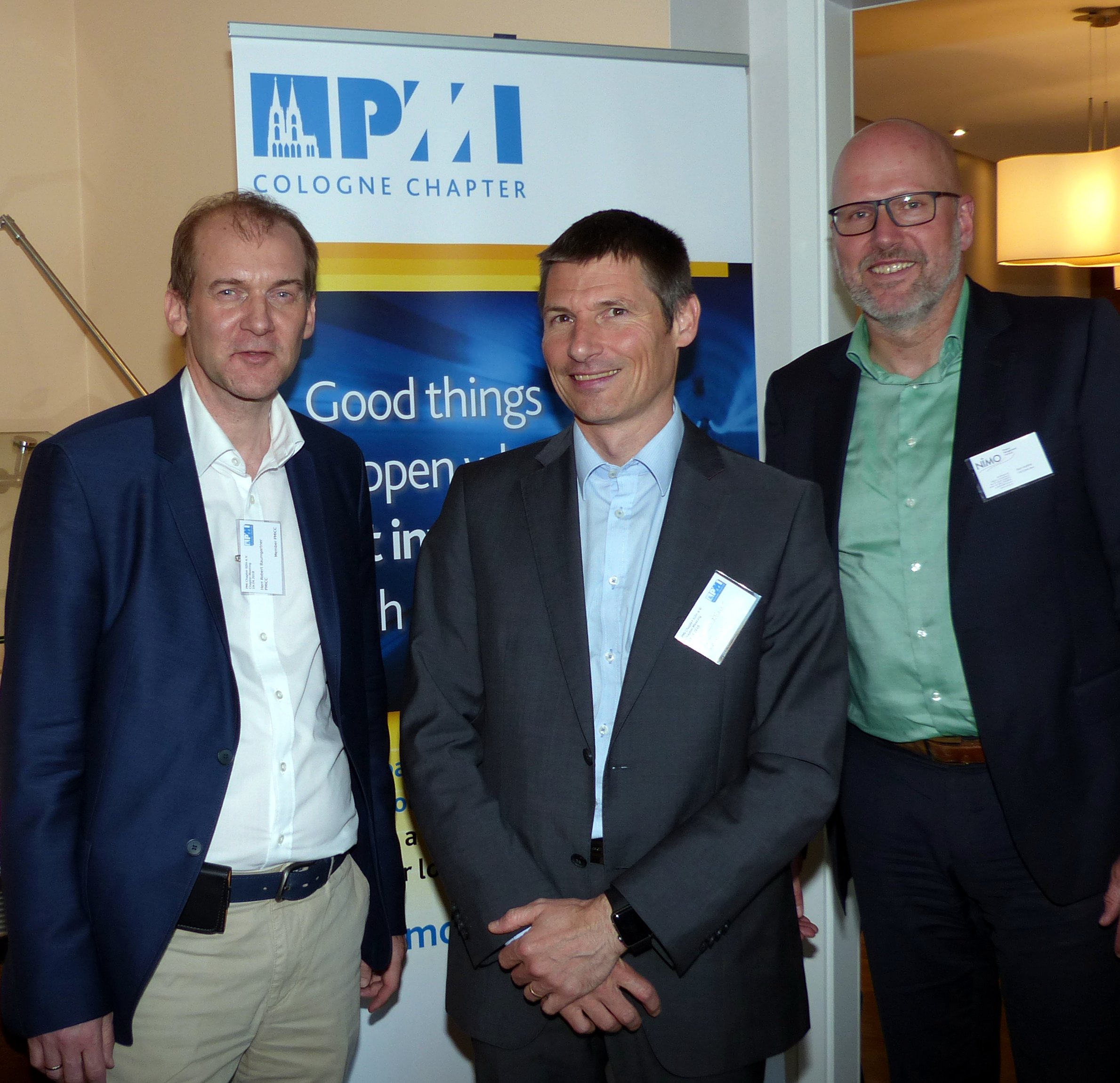
Dear Members and Friends of PMI Cologne Chapter (PMICC),
While temperatures were going up about 40 participants and two guest speakers, Bart Hoitink and David Colliquet, met each other in Aachen (Aken) to talk about Servant Leadership and Intercultural Factors on the 1st summer day in 2018.
Robert Baumgartner, VP Finance & VP Sponsoring, from PMICC welcomed all participants and guest speakers to an extraordinary chapter meeting. It was held in only English and got quite interactive due to an exercise and dialogues to which all participants contributed, proving us a big interest into these topics.

Bart Hoitink, CEO of NIMO Project Management Institute (NL) and co-founder of The Project Leadership Institute (NL), started with a comparison of career path of a project manager and its gradual expansion of project size from a subproject up to multiple complex and multidisciplinary projects which can be possible mapped to a project sponsor. As a project sponsor you may start as someone being unaware and incompetent in project management and getting mature by becoming a servant leader as an ultimate role in project sponsorship. In the next step Bart gave definitions of servant leadership coming from employees of Greenleaf Center for Servant Leadership, Robert Bosch GmbH, and Telekom AG. In all those definitions it got clear that leadership grows with a service mentality that a leader applies to its team members and management for overcoming any barriers and unforeseen emotions that slow down a project. Thus, a servant leader should have 7 common behaviors on how to treat people with whom a leader is dealing and cooperating. What is quite understandable is that a hierarchy in an organization plays an important role as it has its values (cooperate identity) and enables or disables open communication over all levels in an organization. Through an open communication team members are encouraged to proactively participate in any meetings about risks, needs, and even dilemmas to accommodate and properly handle a critical situation in a decent and positive manner for the whole team, management and project sponsor. By showing an example from a famous construction project in the Netherlands called Sluiskil tunnel Bart summarized the key factors of the success of the project whose outcome was on target with respect to time, money and quality, and which was even finished earlier than expected due to the fact that the government in the Netherlands tried out a new approach: Converting a bureaucratic top down behavior into a much more cooperative and collaborative working style. By doing so the Dutch government applied a servant leading approach to its contractors for bringing them all together and foster collaboration between them and the government. In opposite Bart showed us a cut-out from a book called Leadership (7th edition, ISBN ISBN-13: 978-1483317533) from Peter Northouse in which it is stated that in cultures with low humane orientation such as Germanic Europe countries may hinder servant leadership to be achieved. This statement caused quite mixed reactions in the audience of our chapter meeting which Bart used for making an exercise in smaller groups to come up with good arguments why Peter is wrong. The end result of the exercise gave a few and valuable arguments to object Peter’s statement in the book. Main objections are globalization and agile ways of working that are coming more and more into the play in our industries on various levels in all Germanic Europe countries which makes Peter’s statement quite outdated. With this result Bart finished his presentation and promised us to write a letter to Peter for sharing our thoughts.

Before continuing with a break Robert Baumgartner showed us some statistics from PMI and PMICC, a change in the staffing of board members @ PMICC and forthcoming events from PMI, PMICC, Local Groups of PMICC and IIBA® German Chapter. By end of March 2018 PMI had a growth rate of 8.9% in its membership over the last 12 months whereas PMICC has increased its amount of members by over 22% since beginning of 2017 which is remarkably outstanding and only possible due to an increased interest into our services that the board members of PMICC provide. Another interesting aspect is that the increase rate of (PMI-PBA)® and (PMI-ACP)® certifications grew by 67.16% and, respectively, 32.9% within only one year. And this trend continues.
Katia Agurto is going to take on the speaker’s role of Local Group Westfalen (Dortmund) while Alban Krämer-Delahaye will formally hand over his assignment during our next chapter meeting on Jun 7, 2018. Finally, Robert closed his presentation by sharing the schedule of all events and, in partucular, pointing out a 1st common event between IIBA® German Chapter and PMICC taking place in Oct timeframe.

David Colliquet, owner of CODA Coach, turned up for giving a 2nd speech of the day after passing the break with a lot of networking possibilities, beverages, sandwiches, fruit salad, and different sorts of cake. His topic made a perfect match with the one from Bart, going over from servant leadership to intercultural factors that are not only faced by project sponsors but also by project managers, interacting with all stakeholders in a project. A first take away was his explanation about the concept of culture and cultural lifetime of people which details on what a culture comprises of and how the cultural influence of people may change over its lifetime due to several external factors. As a next take away David introduced us to his 3 pillars of intercultural leadership: Practice, Processes, and People. To all of these pillars he gave examples to explain what is really meant by these? For instance, a solid foundation of project management of good practices is standing behind the pillar “Practice”. Under “Processes” he understood the means with which a project manager steers a project and his/her team with a common way of working together and towards project sponsor and management in such way that intercultural aspects can be explicitly considered from even start of the project till the end. By fostering cultural convergence a project manager is able to overcome any cultural differences to a great extent. A “People” management approach that also looks at values and beliefs of people helps any project manager to maneuver a project through a battlefield of several more or less severe hassles. David rounded up his presentation by giving a concrete example from his own practices by elaborating on cultural differences between French-German Iceberg Model which of course shows a few differences: Failure avoidance and strong hierarchy (French) vs. compromise and strong hierarchy of knowledge (German). Furthermore, David concluded that communication is key and project managers have to be respectful, open, curious and able to anticipate from given situations and also needs a cultural leadership background for being successful in an agile, multinational and multidisciplinary environment.
We would like to thank Bart and David for their input on servant leadership and cultural factors which makes it easy to understand what it is all about and how it can be put into practice. Also, we appreciated the service from the hotel, its beverages and food which was all founded by PMICC.
PDU Reporting
Provider = C298, Course ID: CM = CM180419, Leadership = 2.
Looking forward to seeing you all back in Muenster on June 7, 2018.
PMI Köln Chapter e. V.
www.pmicc.de
V.i.S.d.P. VP Finance & Sponsoring Robert Baumgartner, PMP, PRINCE2


